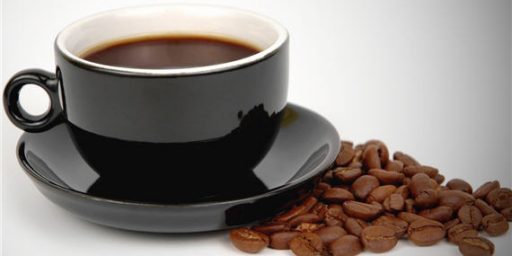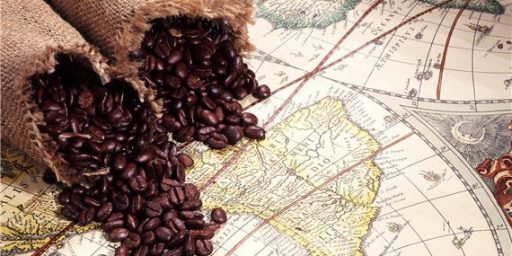Too Much Coffee? Man!
Via NPR’s The Salt: How Many Cups Of Coffee Per Day Is Too Many?
That morning cup of Joe is a daily, practically sacred ritual for many of us. A large body of research has confirmed that a coffee habit is perfectly fine for most people, and may even have some health benefits – from fighting depression in women to lowering the risk of stroke and prostate cancer.
But is there too much of a good thing?
A study published this week in Mayo Clinic Proceedings suggests that when it comes to coffee, too much appears to be more than 28 cups per week, at least if you are under 55.
The researchers found that younger men who passed the 28 cup weekly threshold – which works out to about 4 cups per day – had a 56 percent increased risk of death from all causes. Younger women who were heavy coffee drinkers had a greater than two-fold increased mortality risk.
Ok, so what gives?
Lavie and his colleagues looked at more than 40,000 people, ages 20 to 87, who were enrolled as part of the Aerobics Center Longitudinal Study, a long-term study conducted between 1971 and 2002. The researchers followed up with the participants for 17 years on average. But they were only asked about their coffee consumption once – so, as Lavie himself notes, we don’t know how their coffee habits changed over time.
Another limiting factor: smoking. Heavy coffee drinkers in the study were more likely to be smokers – which makes sense, since the data was collected beginning more than 40 years ago. Van Dam thinks the research didn’t do enough to control for smoking. In fact, as we’ve previously reported, lots of studies in the 1980s failed to control for the link between coffee drinking and smoking, which is one big reason why early research appeared to give coffee a bad rep. Evidence suggesting health benefits from coffee began to emerge only as studies separated the two habits.
So, really, it doesn’t seem that one can draw coffee-specific conclusions from the study.
One thing I always wonder about in these studies, especially when based on survey data, is what constitutes a “cup”? Does it constitute an actual, 12 8* oz cup (as in the measurement) or is it whatever you happen to drink out of? I just finished a “cup” of coffee, but the mug from which I drank is well over 12 8 ounces in volume. And let’s not even get started about tall, ventis, shmentis, or whatever. If the goal is to link amount consumed to health outcomes, this would seem to be rather important.
The study itself does note the lack of follow-up measure of per cup consumption as well as no measure of coffee preparation methods as well as noting:
residual confounding may still exist even though we adjusted for all the potential confounders available in the present study. Smoking is likely to be one of the most important factors to cause residual confounding in this investigation.
I am not a stat guy, and I certainly am not versed in medical research (although it is amazing the degree to which this type of analysis is not all that different from a lot of what is done in the social science, since it is really survey analysis and not biological research).
It is worth noting that the study claims to have found an association, not a causal link. The value of the study is that it provides the basis for future research that would be able to address the questions left open. As such, I am not going to adjust my coffee consumption habits just yet. Granted, I like to drink coffee, so maybe I am suffering from a case of confirmation bias.
The article can be found here: Association of Coffee Consumption With All-Cause and Cardiovascular Disease Mortality
*Cleverly I illustrated the fact that most people do not self-operationalize “cup” properly.






Clearly:
A cup is a mere 8 oz, so the difference is even more extreme than your original scenario.
It sounds like you need to spend more time in the kitchen, Steven. No, wait — maybe this means you should continue to stay out of the kitchen.
@Boyd: 🙂
Just proves my point: everyone defines “cup” differently 🙂
Actually, the “cup” on a coffee maker is 5 to 6 ozs.
So, when they write up research on “cups of coffee” without defining the cup, you know they’ve really not done anything scientific.
It also seems to me that, along with cigarette consumption, individuals who drink this much coffee are probably also probably likely to consume other items, in particular alcohol, at elevated levels as well. Additional, if one was to look at their broader lifestyle and work/play mix, one might find that they tend to burn the candle at both ends.
Both those factors would definitely tip things in the balance of death due to both organ failure and cancer AND death by human error/misadventure (which “all causes” also suggests).
@Steven L. Taylor: Then you definitely need to stay out of the kitchen. 🙂
I think it’s the mega coffee junk drinks – mocha, whipped creme, sugar – that will kill people early.
Whether I’m at Peets, Starbucks or some independent place, I notice that the younger guys – aged 20 to 30 – always get the largest cup of coffee (16 or 20 oz, not sure of the amount, but always largest), and most of these guys pour in the sugar or sweeteners too.
Yeah. A B C D
One gal I knew described herself as a “handfull”!
My regular cup is 24-oz. Anything smaller is just a demitasse.
And only use sugar — rarely, at that — with iced coffee, also in 24-oz glasses.
I can’t drink more than a 2 cups a day anyway (6 or 8 oz). But it would be nice if they defined what constituted a cup in the study.
I have a brother in law who actually eats very healthy but he probably drinks about a pot of coffee a day (he drinks it black so no sugar or cream to add fat/calories).
@Steven L. Taylor: Traditional old world measurement for a cup of coffee was four ounces.
@Ben Wolf: All of which points to the problem of how many “cups” people think they are drinking.
@Steven L. Taylor: It confuses me too. All too often the studies never specify.
Cup of espresso mud or Folgers black water?
This is almost always the case with research into diet and disease or death. Causal links are just not found. This isn’t to say the association studies are never valuable; he dangers of smoking were first identified that way. But if the association isn’t extremely strong, and other factors are not eliminated, I always take these studies with a grain of salt.